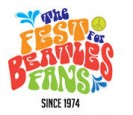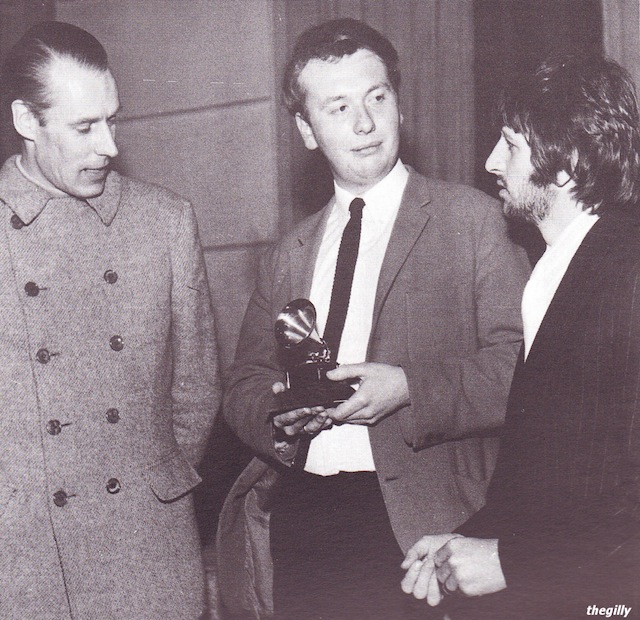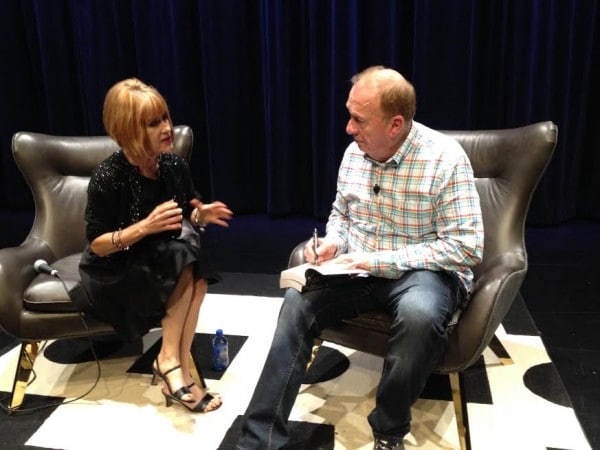“What kind of life am I living?”
That’s the question I’ve asked myself many times over the past 31 years as I’ve been extremely privileged to meet and interview many of John Lennon’s childhood friends, early band members, family members and Beatles associates in the process of writing The John Lennon Series. I’ve been so fortunate to get to know many people whom I never dreamed I’d even have the opportunity to meet!! And, let me hasten to say that that great good luck has never been taken for granted! Each day, I’m immensely grateful.
This past weekend, I was invited by the good folks at the GRAMMY Museum® Mississippi to meet Geoff Emerick and then hear him speak and answer questions about his stellar career. And having long been a student of his book, Here, There, and Everywhere and an admirer of his remarkable work with The Beatles as Engineer on Revolver, Sgt. Pepper’s Lonely Hearts Club Band, and Abbey Road, I was elated. I knew I’d enjoy the time spent with Geoff, but truly…it was even better than I’d anticipated.
Dressed in a plaid shirt, beige chinos, and high-top olive Converse, Geoff was casual – kind and unassuming. When I introduced my husband and myself to him, he shook my hand and said, “Geoff Emerick.” (As if we wouldn’t know!) He was honest (saying “I don’t remember” or “I can’t recall” when he didn’t). He was funny and articulate. And, he was very generous with his time, giving the intimate audience of less than 50 people two full hours of his time and memories…and then spending a great deal of time off stage signing autographs, answering questions one-on-one, and taking photos.
It was an incredible evening, and I thought you might enjoy hearing a few of the wonderful quips and quotes that he imparted to those who gathered to share “An Evening with Geoff Emerick.”
On John Lennon:
“He was the most aggressive of the four Beatles, but when he sang his voice held the most emotion. Tender. I always guessed he was thinking about his childhood.”
On Ringo Starr:
“He drummed his heart out in the studio! When the evening ended, there were broken pieces of drum sticks all over the floor.”
On recording the final guitar solos for “The End”:
“Yoko went literally everywhere with John. I mean, she sat on the floor outside the bathroom when he went in. But when he entered the studio to play his solo on ‘The End,’ he put up both hands and stopped her. ‘Not this time, luv,’ he said. And when they played those solos, they were sixteen again.”
On Mal Evans:
“The boys used to get rather aggravated with Mal if he didn’t have the things they needed. So he kept a roadie bag of just about everything: bandages, biscuits, elastic, tea, sugar, guitar strings, fuses…”
On George Harrison’s Indian music:
“Paul and John shared a nod ’n’a wink when George was recording his ‘new sound.’ I could tell they were thinking, ‘It’s all very nice, but it isn’t The Beatles, is it?’ But they went along.”
On The Beatles after Rishikesh:
“After India, they came back different…people we hardly knew. Dressed differently, they acted differently. Niggling at me. They weren’t the same people, and it wasn’t a change for the better.”
On Click Tracks:
“The only time we used a click track was in making ‘Eleanor Rigby.’ There was one playing in George Martin’s headset as he conducted the octet. Otherwise, we didn’t use them. They made the music too… artificial.”
On his knack with music:
“When I was a little boy, I had a toy gramophone on which I played 78’s. After I heard a song, I could sit down at the piano and play back what exactly I had heard. I didn’t have to plunk around for the correct notes. I knew where the next one would be.”
On recording:
“I see it as painting a picture with tonalities.”
On mono vs. stereo recordings:
“The mono mixes were made with The Beatles there, giving their input. They were never around for the stereo mixes. That was George Martin’s interpretation of what they’d want…and my interpretation. So, the mono recordings are the definitive mix.”
On Revolver:
“The role of the engineer changed with ‘Tomorrow Never Knows.’ No longer was I there just to capture sound. I was now creating sound.”
As you can see, it was a fantastic evening. Geoff would talk about a track, and then we’d play it and listen together. How exciting was that?!
Many of the aspects of being an author are less than glamorous: standing for eight to ten hours in a booth and stopping strangers with “Have you heard about the book?” just to get your work into the hands of readers is next-to-awful. But having the rare opportunity to chat with Geoff Emerick (or Bill Harry or Bob Wooler or Rod Murray) makes it all worth it.
When Geoff Emerick was invited by George Martin to become the Engineer on Revolver, he was fondly known to The Beatles as “Golden Ears.” And one can see why. However, after this past Saturday night, I’ll always think of him as “Magic Man.” His expertise, ground-breaking recording techniques and invention of new equipment (such as the Automatic Double Tracking device) astound me. But even more impressive is Geoff’s in-depth understanding of what The Beatles’ vision was for their music and his innate ability to give that vision life.
Geoff helped deliver the magic that became Revolver, Sgt. Pepper’s Lonely Hearts Club Band, and Abbey Road. Winning Grammys for these three LPs was, of course, incredibly well-deserved. But he won much more, didn’t he? Our hearts.
Jude Southerland Kessler is the author of the John Lennon Series: www.johnlennonseries.com
Jude is represented by 910 Public Relations — @910PubRel on Twitter and 910 Public Relations on Facebook.












wonderful report/article jude!!!!!!!!!!!!!!!!!!!!!!!!!!!!!!!!!!
Good Interview with Geoff Emerick! I think his book, Here There and Everywhere, is one of the best ones on The Beatles, especially of course, on how they got those recorded sounds, but also for insight on each of their personalities. I’m writing my own Beatles’ book and eyewitness information from the people who were there, has helped me greatly. “THE BEATLES’ BEGINNINGS/MEETING PEOPLE WHO WERE THERE.”https://beatlely.wordpress.com/2014/09/09/the-beatles-beginningspeople-from-the-mono-days/